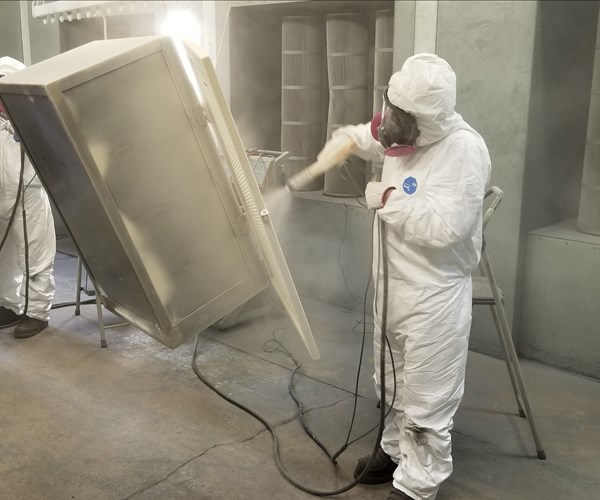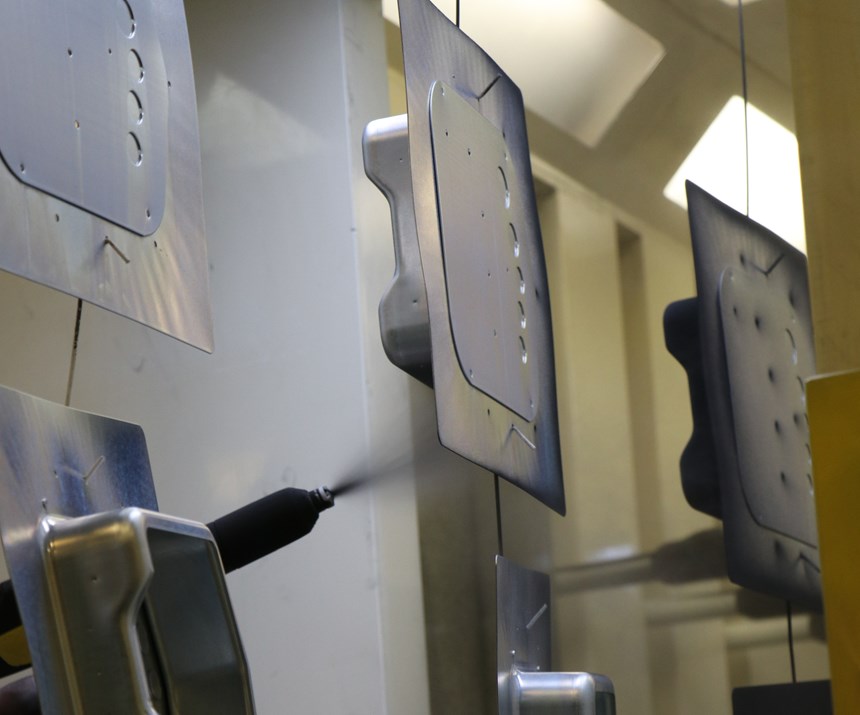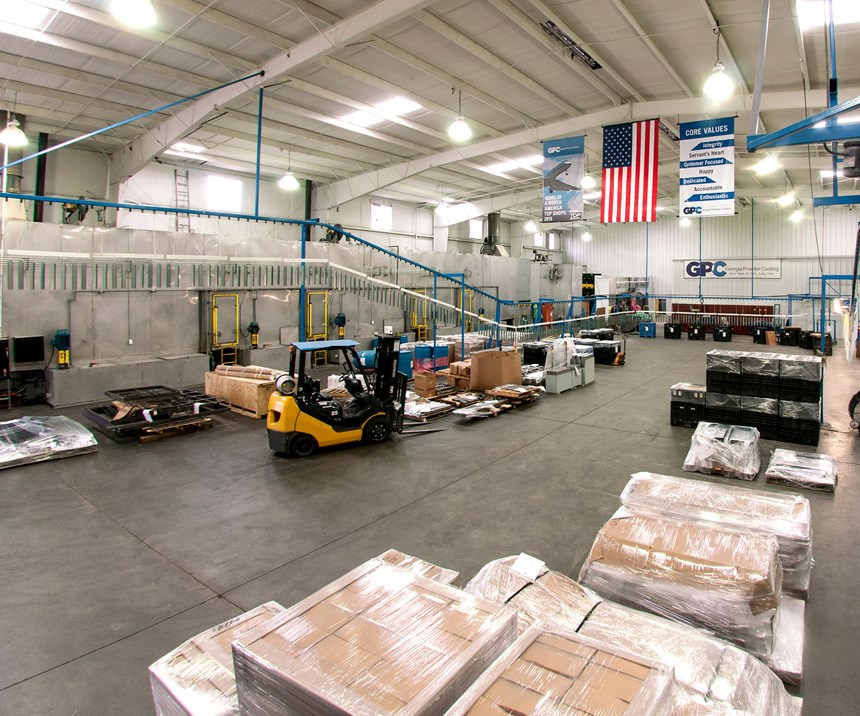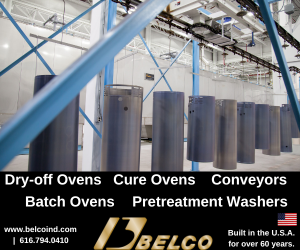Powder Coating Institute 3000 and 4000 Certifications—What You Need to Know
Assessment Program Offers Comprehensive Audit for Custom Coaters and OEMs
The Powder Coating Institute’s certification program is an assessment of a company’s capability to produce quality parts. Those who pass the comprehensive audit demonstrate that they can meet a high professional standard in the industry.
“PCI Certification is an extensive audit program that evaluates an applicant’s powder coating processes and procedures; equipment; maintenance practices; and quality control capabilities to ensure they have the capability of producing a high-quality, powder-coated product,” says Trena Benson, PCI’s executive director.
The program offers two certification types—PCI 3000 Certification applies to custom coaters, and PCI 4000 Certification applies to original equipment manufacturers. We sat down with Benson and discussed various components of the assessment, and why coaters should take advantage of the program.
Q: Why is this certification important for powder coating applicators?
A: PCI Certification is intended to improve and enhance a coater’s ability to apply powder coatings; optimize their performance; recognize the merits of a capable coater; and contribute toward raising industry standards. It certifies through a third-party that the coater has the capabilities and competencies to produce a high-quality, powder-coated product.
Q: What is the difference between PCI 3000 and PCI 4000 certification?
A: PCI 3000 Certification applies to custom coaters and enables them to show manufacturers that they take their powder coating needs seriously, and have taken appropriate steps to ensure they have the equipment and procedures in place to meet clients’ specific requirements. PCI 4000 Certification applies to original equipment manufacturers (OEM) and illustrates an OEM’s commitment to quality, and confirms they are capable of producing a high-quality coated part that meets consumer expectations.
Q: What is the process for a shop to obtain certification?
A: Certification candidates must submit an audit application that includes acknowledgement of OSHA/NFPA compliance requirements. They must also select their audit and system type, and note both primary and secondary contacts for all audit-related activities. At the time of application, the certification candidate must provide three potential dates for the on-site audit (which must be at least 30 days after the application date). Scheduling the audit a minimum of 30 days out gives the certification candidate time for final preparations and helps to manage auditor travel expenses. Upon payment receipt that is due with the application, a pre-audit telephone consultation is conducted between the applicant and auditor to review facility setup, answer questions, and finalize the on-site audit date. At that time, the candidate also receives the detailed audit questions and expectations. This information is particularly helpful for the company to complete their final audit preparations. The on-site audit is conducted by a qualified third-party auditor selected by PCI. The auditors are industry experts with a minimum of 10 years’ experience in the powder coating industry who possess a comprehensive understanding of the complete powder coating process, including process operation, safety standards, equipment design requirements, QA/QC procedures, process control, pretreatment chemistries, powder formulas and more. The on-site audit duration is a minimum of one day and a maximum of two, and is performed using PCI scoring developed for the purpose of assessing line operation capability. Companies that successfully complete the audit are PCI Certified for one year and are required to complete an annual Certification Maintenance Audit for the next two years, which is a self-audit coordinated by the PCI Certification Program Administrator. A full on-site audit is required again in year four, following the same process as the initial certification audit.
Q: What are some of the items that auditors will be examining?
A: The certification audit is comprised of nine different competencies:
- Incoming Quality Control—documentation and evaluation of parts prior to coating; powder coating inventory usage, storage conditions and evaluation procedures; technical and safety data maintenance and availability; and reject process.
- Pretreatment—processes used, equipment condition, maintenance procedures and adequacy for substrates being treated; and routine testing to confirm satisfactory pretreatment results are also evaluated.
- Application Area—location and condition of application area; compressed air quantity and quality, as well as system location and distribution design; powder reclamation process; application equipment condition and maintenance; and condition of collection booth and related equipment, maintenance and cleaning procedures.
- Ovens and Curing—equipment condition, calibration and preventive maintenance procedures and documentation’ process for set point changes and cure cycle requirements for different masses.
- Process Control—job tracking for the entire coating process, including documentation of line speed, cure temperature, pretreatment, coating data, production schedule, and more to ensure repeatability.
- Maintenance—program, schedule, and documentation process for equipment maintenance.
- Training—training process for all powder-coating personnel, including operators and supervisors.
- Final Quality Control—definition of quality parts versus rejects; testing process and frequency. Existence and condition of specific quality control area; root-cause analysis process.
- Loading, Unloading and Packaging—loading and hanging process supports coating objectives; rack and conveyor condition to support a quality ground; part handling, evaluation and touch up process; and packaging specifications and consistency.
The number of specific points assessed under each competency ranges from three to 32. Supporting documentation is required for each competency to confirm processes and procedures are followed to the degree and frequency communicated by the certification candidate to the auditor is accurate and valid.
Q: How can operations improve their efficiencies through a PCI Certification?
A: The audit can be used as a basis to create a continuous improvement process for enhancing their powder-coating operation. The transparency built into the audit report enables a company to easily identify weaker competencies that could benefit from improvement and indicates the required achievements in order to improve their score. Therefore, the company is able to concentrate on the items where they scored the fewest points and improve their overall operation.
Q: What are the costs for obtaining PCI Certification?
A: On-site audit costs vary depending on the number of facilities being audited as well as if the facility has one powder-coating line or multiple. PCI membership is not required for certification. However, PCI members receive a significant discount on audit fees. Certification candidates are also responsible for the auditor’s travel expenses.
Q: What are other benefits an operation receives by being PCI Certified?
A: Certified coaters are afforded a number of benefits. First, the custom coater or OEM receives a qualified, third-party assessment of their capabilities. This assessment provides a basis for a continuous improvement process to enhance powder-coating operations and serves as a benchmark against industry standards. In addition, certification enables a company to differentiate themselves from other coaters and in the case of custom coaters, can provide access to business opportunities requiring the use of a PCI-Certified powder coater. Certified coaters also have access to the PCI-Certified logo for inclusion in marketing and quality materials to promote their certification status. This generates overall image elevation as a result of the associated high standards of certification. Certified coaters are also highlighted on the PCI website and in Powder Coated Tough magazine.
To learn about or apply for PCI Certification, visit www.powdercoating.org/certification
Abitl Finishing Says ‘Just Do it’

Abitl Finishing operates two coating operations in Tulsa, Oklahoma, totaling more than 160,000 square feet. Obtaining PCI certification was one way company officials believed they could ensure the facilities were exceeding the standards they were promising their customers.
Michelle Krebs, Abitl’s quality department manager, says her facilities are PCI 3000 Certified as a customer coater, and first achieved certification in 2017. They just completed and passed their maintenance audit for 2018 and are certified through the end of 2019.
“We wanted to give our customers an assurance that we adhere to best practices,” Krebs says. “Having evidence that demonstrates we are committed to continual improvement goes a long way.”
Abitl custom powder coats for several industries, including the industrial, oil and gas, commercial, architectural, residential, automotive, metal fabricators, appliances, marine, specialty, aerospace, electronics and telecommunications.
Krebs says the certification process was thorough and clear-cut, and PCI scheduled the audit in a timely fashion.
“There was no ambiguity, and PCI answered any and all questions,” she says. “The process was generally smooth going. And because the requirements are so clear-cut, we were able to confidently make changes in a small amount of time.”
Abitl has an 1,800-foot automated conveyor system that precisely cleans, coats and cures thousands of parts powder coating parts per hour. The system includes a seven-stage wash system; two automated 14-gun Nordson powder booths; and an 80-foot, dual-stage curing oven.
Krebs says the PCI certification helped make valuable changes in several aspects of their operation, such as in their pretreatment system and masking procedures.
“It has also boosted pride in workmanship,” she says. “We are all united knowing that we are working every day to a set of recognized standards.”
Krebs has advice for coaters who are looking at PCI certification—just do it.
“There is absolutely no reason to not do it,” she says. “Obtaining this certification will benefit an organization internally, and provide your customers with confidence. There are no down sides here.”
Visit abitl.com
Related Content
Understanding and Managing White Spots on Anodized Aluminum
Having trouble with spotting defects when anodizing? Taj Patel of Techevon LLC offers a helpful overview of the various causes of white spots and potential solutions.
Read MoreCuring Oven Basics
Simply heating up the substrate does not cure the coating. There are many variables to consider when choosing the best cure oven for your application...
Read MoreTop Reasons to Switch to a Better Cleaning Fluid
Venesia Hurtubise from MicroCare says switching to the new modern cleaning fluids will have a positive impact on your cleaning process.
Read MoreHow to Choose Between Sulfate and Chloride-Based Trivalent Chromium
There are several factors to consider when choosing between sulfate and chloride-based baths for trivalent chromium plating. Mark Schario of Columbia Chemical discusses the differences and what platers should keep in mind when evaluating options.
Read MoreRead Next
A ‘Clean’ Agenda Offers Unique Presentations in Chicago
The 2024 Parts Cleaning Conference, co-located with the International Manufacturing Technology Show, includes presentations by several speakers who are new to the conference and topics that have not been covered in past editions of this event.
Read MoreEducation Bringing Cleaning to Machining
Debuting new speakers and cleaning technology content during this half-day workshop co-located with IMTS 2024.
Read MoreDelivering Increased Benefits to Greenhouse Films
Baystar's Borstar technology is helping customers deliver better, more reliable production methods to greenhouse agriculture.
Read More
















.jpg;maxWidth=300;quality=90)








